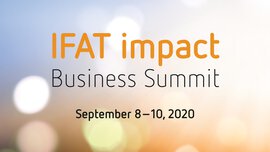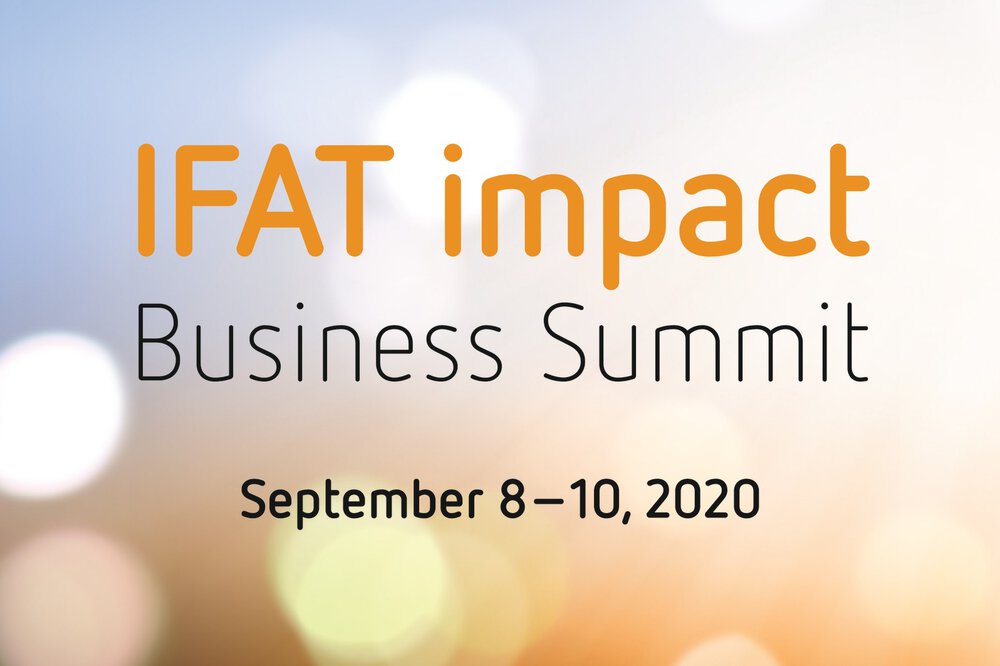IFAT impact Business Summit: Food packaging with environmental perspectives
August 21, 2020
- Stimuli from recycling rates and consumer desires
- Sustainable packaging, new multi-use concepts
- Digital IFAT impact Business Summit, September 8–10, 2020
In recent years, the environmental aspects of food packaging have become even more important. On the one hand through regulatory measures, such as the Packaging Act, which came into force in Germany in 2019 and requires higher recycling rates. On the other hand by consumers, who increasingly wish for less complexly packed or unpacked food.
The requirements of food and beverage manufacturers thus got tougher. “For the food industry, it is also important to ensure that the packaging used is designed for recycling and to ecologically and economically consider what share of recyclates can be used,” says Peter Feller. According to the Deputy Managing Director of the Federation of German Food and Drink Industries (BVE), there are also conflicting goals with regard to resource conservation that need to be mastered. “For example, smaller portion packs counteracts food waste, but requires a relatively higher material input,” says Feller. “However, consumer health protection is not negotiable: packagings must comply with the food law in order to avoid effects on the product and thus on the health of the consumer.”
Disposable PET bottles: share of recyclates already high
Currently, there is only one recyclate from industrial recycling sources that is approved for food packaging, namely PET from the one-way deposit system. According to a study by the German Society for Packaging Market Research (GVM), German one-way PET bottles contain an average of 26 percent recycled materials. With the quality mark “Wertstoff PET Getränkeverpackungen” (recyclable PET berverage packaging), the German RAL Quality Assurance Association has set the goal of achieving an average recyclate content of 50 percent by 2022. However, there are already a number of bottlers who use bottles made from 100 percent recycled waste material. Bad Dürrheimer Mineralbrunnen GmbH is one of the pioneers in this field.
Technically feasible: more recyclates in raw material quality
“Over the next years, PET’s unique position can be overcome thanks to chemical, enzymatic or solvent-based recycling,” Peter Désilets is sure. The Managing Director of Pacoon GmbH, a Munich-based design agency for sustainable packaging solutions, continues: “These technologies allow for a quality that is comparable with fresh batches and can also be used for food packaging. However, policy-makers and jurisdiction still view this approach with concern. In addition to the industrial recycling standards, we therefore also need an appropriate legal framework.”
Paper bottles
Renewable raw materials are another approach to more environmentally friendly food packaging. One of the trending materials is paper. For example, the spirits producer Diageo recently announced that, starting next year, it will for the first time sell its whiskey Johnny Walker in bottles that are entirely made of paper and biological material. The Carlsberg brewery group also pursues the paper bottle concept and presented two prototypes of the “Green Fibre Bottle” in 2019.
Bioplastics: new opportunities, new questions
Materials made from renewable resources also include bio-based plastics, which primarily use starch and cellulose as basic materials. “Some of these were developed decades ago, but have not really got off the ground yet, because petroleum-based plastics are cheap, easy to use. And the responsibility for the disposal of mineral oil-based packaging was transferred to the Dual Systems with the license fee,” reports Désilets. According to his observation, these old/new solutions receive a strong boost as plastics are now increasingly tried to be avoided—and at the same time raise questions: How can the non-mineral oil-based materials be disposed of or recycled? What does the carbon dioxide or ecological balance look like? Do the raw materials come from reliably certified, ecologically acceptable sources? And what is the footprint in nature if bioplastics are not disposed of properly?
Disruption through multi-use food packaging?
Another alternative to current practice is a new, international system of reusable food packaging as currently established by Pacoon GmbH and its partners. In this approach, products such as chips, gummy bears, nachos, noodles, rice or legumes come in reusable boxes for which a deposit return system is to be installed. Pacoon’s Managing Director Désilets: “We see a holistic, disruptive approach of the existing multiple-use system in order to increase the potential for optimization. The envisioned result is a simple system for the consumer as well as significant cost and material savings for the manufacturers.”
IFAT impact Business Summit from September 8–10
Waste recovery, recycling and raw materials management are core topics of the environmental technology trade fair IFAT, where the food industry finds products and solutions for sustainable packaging. In September, the digital three-day IFAT impact Business Summit will bring together the global environmental industry and its customers. This event will be all about environmental technologies used in the industry—from the chemical, food to the construction sector—and in local authorities. Participation is free of charge for visitors; the platform will go live at the end of August.
Downloads
78321
Belonging images



- PR Manager


